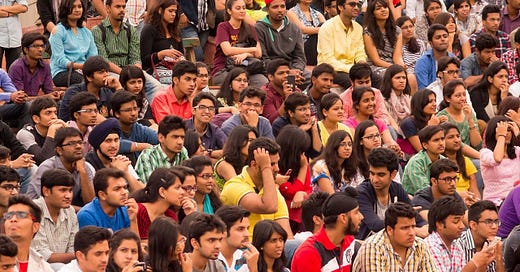What Do We Owe Our Young?
What we owe our young is not just welfare or opportunity but meaning
I haven’t written in a while. The past few months have been busy busy busy. Getting something from concept to almost-done to actually-done is drip-drip slow. In this time, I’ve often thought about how money is such a great expediter. We airily ascribe meagre outcomes to individual deficiencies. But we seldom do any accounting of the meagreness of intellectual outcomes produced by those who have - and deploy - vast sums of money. To do the latter would lay bare the bullshit that the rich—or their delegates - engage in, just to avoid taking a stand or disturbing the status quo.
But that’s another post.
Today is about something else that’s been on my mind for quite some time—especially in these turbulent times, where we seem unable to come together or collaborate on anything of substance.
What do we owe our young?
India has the largest youth population in the world. With 65% of our population below the age of 35, there is moral urgency to the question: what do we owe our young people? Not just in terms of education, health, environment, or jobs—but something more fundamental—how should they view their place in the world and their relationship with it?
What we owe the young is not just welfare or opportunity but meaning.
Of course, India remains deeply poor and riven with inequality. Material aspirations and economic opportunity rightfully hold great fervor for millions of our youth. But the obligation to construct meaning isn't on the young—it falls to those of us with power and privilege. And it is here that we are coming up short.
The Two Failures of Contemporary Leadership
The first kind of leadership - achievement-obsessed and technocratic - derives legitimacy from metrics, not values. Within this discourse, there is no space for morality, shared responsibility, or public ethics. It's hustle, hustle, hustle. Work extreme hours, achieve this metric or that milestone - with little thought to how actions impact the larger society. Success is defined as somehow escaping the masses. The more "exclusive," the more successful. Leadership becomes not about upholding some ethic but acquisition of extreme wealth or exercising power. Power in service of what?
In India, the dominant elite narrative - steeped in this technocratic, managerial ethos - reduces aspiration to upward mobility. But if the idea of success is stripped of moral imagination, civic commitment, or responsibility, then what kind of country - even community - are we building? The message to the young is: climb, but don't ask where you're climbing to. That breeds anxiety, entitlement, and moral hollowness. We've handed the next generation a narrative of achievement without a moral framework. We told them, "Follow your passion," but not how to define what's worth being passionate about leaving them passionate only about money and/or power
The second type of leadership invokes morality, but this invocation often feels instrumental. Moralism is deployed like a weapon in the battle for legitimacy, rather than as a sincere attempt at co-creating a normative vision. In such a setting, meaning itself becomes polarizing, and public morality is seen as either partisan or performative. This impoverishes both politics and citizenship. When moral critique becomes merely oppositional, it undermines solidarity.
As politics becomes tribal, moral language gets weaponized. We've entered a crisis of meta-trust - we no longer believe anyone is making moral claims in good faith. Even well-intentioned calls for justice or dignity are read as veiled power plays. That leaves a vacuum which hustle culture readily fills. It's seductive because it's apolitical - it pretends you can opt out of moral considerations and just focus on the "grind."
Beyond Right and Left: Co-Creating Meaning
The answer lies neither in right-wing traditionalism nor in classical liberalism. The Right may provide meaning in a didactic, top-down manner, but at the cost of pluralism. Liberalism, on the other hand, over-indexes on individualism and relativity, resulting in a fragmentation that can only disorient young people. The search for meaning cannot come from either the bureaucratic state or the market alone - it must be grounded in community.
What we need is a shift from moralism-as-antagonism to morality-as-shared-framework. This doesn't mean sanitizing disagreement, but recovering a common grammar - a way to talk about truth, justice and responsibility without immediately collapsing into faction.
Reimagining Fraternity
We must reimagine fraternity - that neglected constitutional ideal - not as sentimentality, but as the political and ethical infrastructure of citizenship. The young cannot be asked to belong unless the society they are asked to belong to acknowledges and values their lived realities.
This requires building common spaces where meaning isn't just handed down but co-created. We owe our young stories that connect them to something larger than themselves - duty, virtue, transcendence, the common good. We owe them not just opportunity but solidarity - a willingness to share space, power, and moral imagination.
The co-creation of a normative horizon isn't about consensus but process. It's about designing institutions and forums where people - especially the young - see that their participation matters. If they experience citizenship as passive, the horizon narrows. But if they experience it as formative, dynamic, even uncomfortable - they might help build something expansive we can all inhabit together.
What might this look like in practice? It means creating civic forums where young voices are not just heard but incorporated into decision-making. It means educational institutions that emphasize not just skills but civic virtues. It means business leaders who measure success not just by profit but by contribution to community welfare. It means political discourse that treats opponents not as enemies but as fellow citizens working toward a common, if contested, good.
We owe our young a normative horizon - a sense of what it means to be free, to be equal, to live well in a democracy. Right now, they see little in our public discourse beyond economic growth and political grievance. The challenge now is to construct a shared space which offers our young meaning - not through enforced conformity but through engagement with both values and the specific circumstances of their lives.
Without this, what does being part of one country - what does citizenship itself - even mean?
Also Read:
Between Belonging and Thinking: Thoughts on the Year Past
The year is coming to a close. I have never gotten into the new year hoopla: time, like life, is continuous, and there is no "new" year—but a year does represent a significant passage of time, and one can’t help but reflect on the year past. This post is thus about some thoughts that have recurred to me over the past year—some …









Very thought provoking Ruchi! I agree with so much of what you wrote and worry that we aren’t doing enough to create these spaces of meaningful dialogue. Where these communities emerge, it is often a struggle to balance individual and group aspirations, and to sustain movements in the face of entrenched and disproportional power. But these are exactly the struggles we mustn’t shy away from.
Such a wonderful article..political discourse is mostly now shouting matches ...wish what you suggest here can be implemented